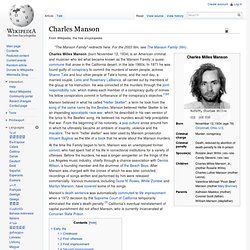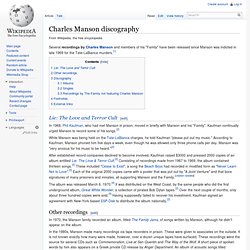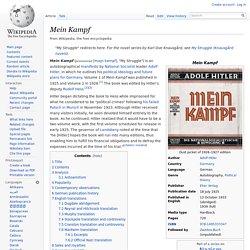

Charles Manson. Manson's death sentence was automatically commuted to life imprisonment when a 1972 decision by the Supreme Court of California temporarily eliminated the state's death penalty.[3] California's eventual reinstatement of capital punishment did not affect Manson, who is currently incarcerated at Corcoran State Prison.

Early life Childhood Several statements in Manson's 1951 case file from the seven months he would later spend at the National Training School for Boys in Washington, D.C., allude to the possibility that "Colonel Scott" was African-American.[5]:555 These include the first two sentences of his family background section, which read: "Father: unknown. He is alleged to have been a colored cook by the name of Scott, with whom Charles's mother had been promiscuous at the time of pregnancy. In the quasi-autobiography, Manson in His Own Words, Colonel Scott is said to have been "a young drugstore cowboy ... a transient laborer working on a nearby dam project.
" First offenses. Charles Manson discography. Several recordings by Charles Manson and members of his "Family" have been released since Manson was indicted in late 1969 for the Tate-LaBianca murders.[1] Lie: The Love and Terror Cult[edit] While Manson was being held on the Tate-LaBianca charges, he told Kaufman "please put out my music.

" According to Kaufman, Manson phoned him five days a week, even though he was allowed only three phone calls per day. Manson was "very anxious for his music to be heard. The album was released March 6, 1970.[4] It was distributed on the West Coast, by the same people who did the first underground album, Great White Wonder, a collection of pirated Bob Dylan tapes.[2] Over the next couple of months, only about three hundred copies were sold.[5] Having supposedly failed to recover his investment, Kaufman signed an agreement with New-York-based ESP-Disk to distribute the album nationally.[2] Other recordings[edit]
Adolf Hitler. Adolf Hitler (German: [ˈadɔlf ˈhɪtlɐ]; 20 April 1889 – 30 April 1945) was an Austrian-born German politician who was the leader of the Nazi Party (German: Nationalsozialistische Deutsche Arbeiterpartei (NSDAP); National Socialist German Workers Party).

He was Chancellor of Germany from 1933 to 1945 and Führer (leader) of Nazi Germany from 1934 to 1945. As effective dictator of Nazi Germany, Hitler was at the centre of World War II in Europe, and the Holocaust. Hitler was a decorated veteran of World War I. He joined the precursor of the NSDAP, the German Workers' Party, in 1919 and became leader of the NSDAP in 1921. In 1923 he attempted a coup in Munich to seize power. Hitler actively sought Lebensraum ("living space") for the German people.
Early years Ancestry Hitler's father, Alois Hitler, Sr. (1837–1903), was the illegitimate child of Maria Anna Schicklgruber. Childhood and education Adolf Hitler as an infant (c. 1889–90). Early adulthood in Vienna and Munich World War I Beer Hall Putsch. Mein Kampf by Adolf Hitler. Mein Kampf. Mein Kampf (pronounced [maɪ̯n kampf], "My Struggle") is an autobiographical manifesto by National Socialist leader Adolf Hitler, in which he outlines his political ideology and future plans for Germany.

Volume 1 of Mein Kampf was published in 1925 and Volume 2 in 1926.[1] The book was edited by Hitler's deputy Rudolf Hess.[2][3] Hitler began dictating the book to Hess while imprisoned for what he considered to be "political crimes" following his failed Putsch in Munich in November 1923. Although Hitler received many visitors initially, he soon devoted himself entirely to the book. As he continued, Hitler realized that it would have to be a two-volume work, with the first volume scheduled for release in early 1925. The governor of Landsberg noted at the time that "he [Hitler] hopes the book will run into many editions, thus enabling him to fulfill his financial obligations and to defray the expenses incurred at the time of his trial. " Title[edit] Contents[edit]